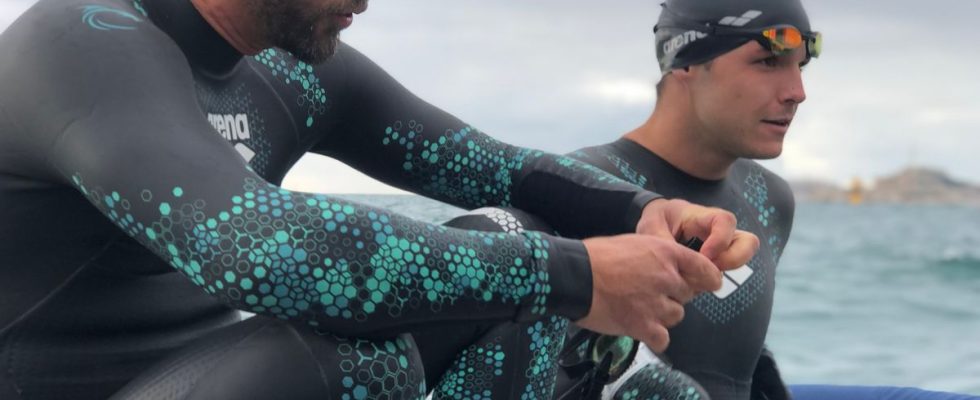Thirty kilometers of swimming off the coast of Cape Town, South Africa, around Robben Island where Nelson Mandela was imprisoned for eighteen years, followed by a hundred bicycle terminals and the inauguration of a multi-sport field in a township in Cap. This is the menu of the “Madiba challenge” that this astonishing team launched, made up of the presenter of “Échappée Belle” (France 5), Ismaël Khelifa and the four-limb amputee Paralympic athlete, Théo Curin. To prepare, they trained off the coast of Marseille, two breaststroke lengths from the Château d’If, where the Count of Montecristo, a character in Alexandre Dumas’ novel, was imprisoned for fourteen years.
With water at 18 degrees, gloomy weather, between rain and gusty wind, and rough seas, they were able to get a taste of what awaits them next April. Interview from a terrace with a view of the Catalans.
Why did you choose Marseille to train for this challenge?
Theo: We wanted to have conditions that would resemble as closely as possible what we will have there, in South Africa. That is to say, already salt water because we usually train in a swimming pool or in Lake Annecy. There we see, there is still a bit of wave, there is also a bit of current, like in South Africa and then there, the water is quite fresh. So, these are the conditions that we came here to find. This is the main reason, even if we like Marseille.
Ishmael: It’s the first time in my life that I’m going to train at sea, but on the other hand I lived here for three years. I got married in Friuli, my son was born here. And we also chose Marseille because the island around which we are going to swim in Cape Town is a bit of the same configuration.
Previous challenges were in South America. Why South Africa this time?
Theo: We are already looking for adventures that are playable, possible. And there, it is first of all the meeting with Ishmaël which makes us go there.
Ishmael: five years ago, I filmed there for “Échappée Belle” in a disadvantaged neighborhood called the townships, this is where they parked non-white populations during Apartheid. And I was very touched by this place where people live on a dollar a day and where there is terrible inhumanity. We are both very sensitive to the cause of childhood. I told myself one day I would go back to do something there, without knowing what, when and how, and it was the meeting with Théo that made that possible.
Theo: In fact I no longer wanted to do sport for the sake of doing sport, to have a motivation other than the distance, the record, the thing. And meeting Ismaël made me want to challenge myself again. Frankly, after the two challenges in South America, I no longer wanted adventure and this meeting re-motivated me, it gave meaning to my training.
Was this project complicated to put together? Find partners, funds… South Africa is far away, France doesn’t really have a historical link with this country…
Ishmael: A project is always difficult, but this project has a strong persuasive force. Because I am a beginner, Théo is a top athlete. He brings the performance side, I bring the committed side, because alongside “Échappée Belle” I have an association called For my Planet. By mixing the two worlds, we managed to do something that met the new desires of Théo’s partners and which allowed me to take a step forward and realize a dream born five years ago.
Sometimes this challenge scares me, it’s an Everest, 30 km of swimming, 100 km of cycling, but then there will be this arrival in this neighborhood which will be fireworks. Because when you go to those places, you’re never the same afterward. You may have read all the personal development books, all this bullshit, there you are. And it blows you in the face.
After the Madiba challenge, Mandela’s nickname, are you considering, for example, a Gandhi challenge on the salt road? Or around other people who were able to embody liberation and solidarity movements?
Ishmael: In fact, we mainly called him Madiba because we are going to film around the island where Nelson Mandela was incarcerated. And in fact Madiba is more the grandfather, he takes care of the young people. We haven’t thought about the future too much, because here we are very focused on what we do. It is so hard. But I’m starting to think about the future slowly because I’m already feeling a bit of the end-of-project blues. We’ll see. What is certain is that this project makes us grow in proportions that we did not even imagine. It’s changing my life. I want to say first let’s see where this takes us because neither Théo nor I imagine where this will take us.
Théo, you are an accomplished sportsman, you participated in the Olympic Games… What challenges in the sporting field would seem insurmountable to you?
Theo: Walking around Paris alone with all the pigeons (laughs). I think nothing is inaccessible, but everything is complicated. My physical limit would be more on walking. As much as I can swim quite a few kilometers, walking ten miles is the New York marathon. Because I don’t have a kneecap on the right, half a quadriceps… there you go, I have the legs of a rooster.
Will you have a role in the 2024 Olympics?
Theo: Not as an athlete. But I have been part of the athletes’ commission since the application was submitted. And afterwards, I hope to be hired as a consultant with France Télévision. I want to participate in one way or another but not as an athlete. In my head, the competition is over. I want to be engaged.

